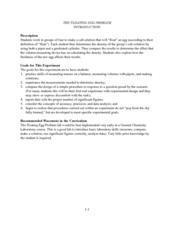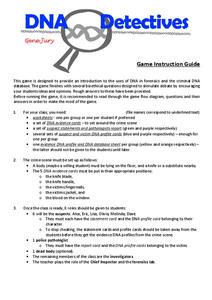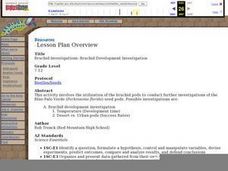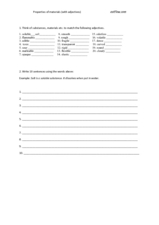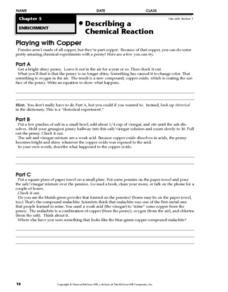Museum of Science
Gum Chemistry
Gum be gone! Scholars conduct an experiment to find the best substance that would help remove gum from the bottom of a shoe. They test peanut butter, petroleum jelly, olive oil, vinegar, and rubbing alcohol in their experiments.
Curated OER
The Floating Egg Problem
This is the grown-up version of the classic "float an egg in salt water" experience, plus an experiment in soap making. High schoolers explore density, but more importantly, practice accuracy, precision, and the use of significant...
Columbus City Schools
ABC: Acid Base Chemistry
Bubble, bubble, boil and trouble! What causes common substances like baking soda and vinegar to react the way they do? Welcome your junior chemists to the wonders of acid-base chemistry using a comprehensive and fun resource. Engage them...
Wild BC
The Greenhouse Effect: Warming the Earth Experiment
First in a two-part lesson on the greenhouse effect, this lesson involves a classroom demonstration of the phenomenon, and a lab group experiment with color and absorption. Although there are easier ways to demonstrate the greenhouse...
Carnegie Mellon University
Ocean Acidification
After brainstorming what they know about ocean acidification, youngsters place eggs in acid to determine the effects on calcium-containing organisms, and add carbon dioxide to solutions with sea shell material to discover the impact on pH.
Gene Jury
DNA Detectives
Police find a man murdered in a local hotel, DNA everywhere, and now they need scholars' help. Budding detectives step into a crime scene playing the roles of victim, suspects, and investigators. They apply knowledge of criminology and...
Captain Planet Foundation
Worm Your Way Out of This
How can you provide healthy soil for your garden? Study worms, bacteria, and other microorganisms in a lesson about decomposition and organic compost. After discussing what you know about worms and watching a video, watch what worms do...
American Physiological Society
Effects of Environment on Enzymes
Much like the tale of Humpty Dumpty, proteins, once altered, will never be the same again. Honors and pre-AP biology classes explore the delicate world of enzymes via a Webquest and lab experiment. The teacher's guide contains all...
Curated OER
5 Types of Chemical Reactions and a Lab on Mole
Students recognize the concepts of the five general types of chemical reaction: combination, decomposition, single replacement, double replacement and combustion. They practice classifying chemical equations and determine the moles in a...
Curated OER
Bruchid Investigations: Bruchid Development Investigations
While this instructional activity is based on the Bruchid beetle, the focus is on conducting a scientific investigation. Ecology explorers vary the temperature or the type of leaf that Bruchid eggs are laid on and test for effects on the...
Curated OER
Chemical Resistance and Synthetic Polymers
Students participate in lab activities in which they examine immersion, stain resistance, and stress cracking of synthetic polymers. Students use their collected data to discuss service applications and possible performance of materials.
Curated OER
Air Pressure
Learners participate in a series of demonstrations about Bernoulli's principle. They explain how air pressure varies with air speed. They write a detailed lab report about the activity. This is a great way to explore this concept.
Curated OER
Digestion & Nutrition: a Case Study
Middle schoolers explore digestion/nutrition and utilize scientific investigation skills. They complete meal logs for several days and graph their results. After analyzing their data, they write formal lab reports.
Curated OER
Properties of Materials (with adjectives)
Help your students write descriptive lab reports! Designed for ESL students but useful for mainstreamed kids as well, the activity prompts students to think of substances that match twenty given adjectives ("salt" for "soluble," for...
US Department of Energy
Thermodynamics—Teacher Guide
I'm so cool! No, you're exothermic. This thermodynamics lab unit includes an introduction, teacher demonstrations, six labs that students rotate through each class day, homework assignments, application of knowledge, and assessments....
NOAA
Stressed Out!
Are our oceans really suffering due to the choices humans make? The sixth and final installment in the volume of activities challenges research groups to tackle one of six major topics that impact ocean health. After getting to the...
Kenan Fellows
The Effects of Environmental Conditions on Aquatic Organisms
What kind of experiment can your class do to how observe the environment effects on organisms? Groups design and conduct lab experiments to learn about the effects of the environment on aquatic organisms. Based upon knowledge gained from...
Curated OER
Fall-5 The Scientific Method Midterm Progress - Biology Teaching Thesis
Students use the scientific method explicitly and independently to solve a problem/answer a question. They are able to write complete and comprehensive lab protocol that helps answer a question and use appropriate grammar and writing...
CK-12 Foundation
Atoms to Molecules: Constructing Helium
Protons and neutrons and electrons, oh my! Physical science scholars get hands-on with interactive atomic modeling. Starting with a simple helium atom, participants create and name ions, then build isotopes. Questions throughout the...
CK-12 Foundation
Mineral Formation: Evaporating Lake
Get crazy for crystals! Junior geologists learn the secrets of crystal formation through lecture, reading, and examples. Other topics include common ionic compounds found in fresh and salt water, the effects of location on forming...
Curated OER
Lab Report Template
Young scholars write a paragraph (complete sentences) which explains what they did in the lab.
Curated OER
Describing a Chemical Reaction: Playing with Copper
Three experiments involving pennies help young chemists see the chemical reactions between copper and other elements. The first experiment is rhetorical (it prompts students to leave a bright penny out for a year) but the second two...
American Physiological Society
An Inquiry into Alcoholic Fermentation
Introduce life science students to their new "best buds" yeast! Using a wide variety of materials, lab groups design an experiment that illustrates how yeast acquires the resources it needs to undergo cellular respiration. The teacher's...
Curated OER
The Affect of Water Temperature on Living Organisms
High schoolers examine the environmental impact of global warming. In this environmental science instructional activity, students design and conduct an experiment about the effect of temperature on paramecia. They write a lab report...



